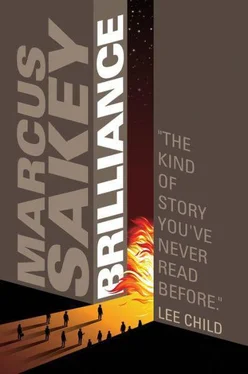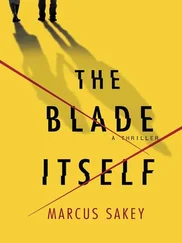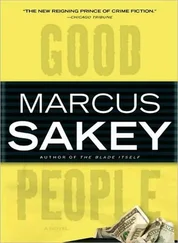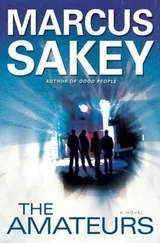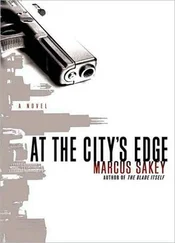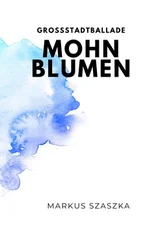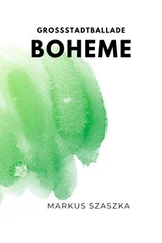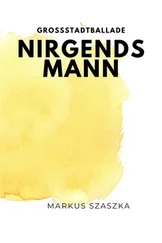Cooper turned, laughing, and that was when a hole blew through the front door in a hail of splinters and a boom that muffled the world, and Quinn staggered back, the front of his suit shredded and a look of childish confusion on his face. Another hole punched beside the first and somewhere behind them glass shattered, and then Cooper clotheslined his partner across the sternum while kicking out the back of his knee, Bobby not falling so much as dropping and Cooper still spinning, his right hand pulling the Beretta and leveling it at the door and taking three shots and then two more, best-guess suppressive fire. The first crack was the loudest, the others seemed farther away. He didn’t give the man on the inside a chance to collect himself, just took two quick steps, yanked open the door, and spun in, adrenaline driving him forward. His nerves screamed at the move, but fight was better than flight, and he needed to see the shooter; he couldn’t read him if he couldn’t see him.
A living room, sparsely decorated, couch and coffee table. A man was standing next to an arch that looked like it might lead to a dining room. About six foot, long hair, and a black T-shirt, a shotgun in his hand, the barrel swinging and—
Shotguns are bad news; the wide spread of buckshot cuts down your edge.
But the holes in the door were small, fist-sized.
He’s firing double- or even triple-ought shells. Call it six nine-millimeter pellets in each. Incredibly lethal, but intended for tactical operations, which means a full choke in the barrel for precision. The lead will only spread about eighteen inches over fifty yards.
And he’s not even ten feet away.
—his finger tightening on the trigger, and Cooper stepped sideways ten inches as a blast of fire bloomed from the barrel of the shotgun and metal shards hurtled through the space he had been standing in. He raised the Beretta and sighted down it. The man in the T-shirt leaped back into the dining room, taking cover around the corner. Cooper tracked the motion, lowered his aim about two inches, and fired. The bullet tore through drywall like Kleenex. The man screamed and collapsed. The shotgun clattered on the hardwood floor.
Cooper moved fast, came around the corner with his weapon up. The man was on the ground weeping and moaning and squeezing his thigh. Thick streams of blood pulsed between his fingers. The room had a card table and two chairs; there was another archway through which he could see the kitchen. No other targets. He picked up the shotgun, locked the safety, tossed it back toward the front door. “Where’s Dusty Evans?”
“My goddamn leg!” His face was pale and sweaty as he rocked back and forth. “Jesus, oh Jesus Christ, it hurts .”
“ Evans . Where is—”
A sound from the other room, a squeak and then a bang. Cooper jumped over the man’s extended legs and the growing pool of blood and sprinted into the kitchen. A wooden door stood open; the sound had been the storm door slamming. He shouldered his way through into a small backyard. A tangle of rosebushes, all thorns and no flowers; a small toolshed; a grill beside a picnic table. The whole thing was framed by wooden privacy fencing eight feet high, which Dusty Evans was in the middle of hauling himself over. Cooper grabbed his leg and yanked.
The man landed on his feet, came up ready to fight, six foot two inches of pissed-off bar brawler. Cooper still had the gun in his hand, but the thing with guns, they had unpredictable consequences. Bullets didn’t necessarily stop in flesh, and in this neighborhood, that flesh could belong to a kid. He waited until Evans made his move, a feinted cross that concealed a jab, then stepped where the punch wasn’t and brought his gun hand into the side of the man’s neck in a brutal chop. Evans collapsed like his bones had vanished. By the time he could move again, Cooper had patted him down and cuffed his hands behind his back.
“Hi,” Cooper said, then jerked the man to his feet by his bound wrists.
“Ow, shit .”
“Yes.” He pushed the man forward. “Walk.”
The inside of the kitchen had the burned smell of gunfire. Cooper pushed Evans ahead of him. “Bobby?”
“Yeah.” The reply sounded heavy, forced. “Here.”
He marched his prisoner into the dining room. The wounded shooter flopped on the floor, pushing down against his thigh with cuffed hands. “Jesus Christ, oh Christ.”
Cooper ignored him, looked at his partner, who leaned against a wall, one hand holding his sidearm, the other hugging his chest. “The vest catch everything?”
“Yeah.” Quinn forced the word through clenched teeth. “Broke at least one rib, though.”
“Messed up your suit, too.”
His partner barked a laugh and then winced in pain. “Shit, Coop, don’t.”
The adrenaline was beginning to fade, leaving Cooper with that rubbery-limbed feeling. He holstered the Beretta, then flexed his fingers, took a deep breath. “You check the house?”
Quinn nodded. “Clear.”
Cooper took another deep breath and a look around. The place had a dorm room feel, everything cheap and secondhand. The couch was Salvation Army. There were no pictures on the wall. Shelves of cinderblocks and boards were packed with books, mostly politics, some memoirs, a row of electronics manuals. The tri-d was the only expensive thing in the place; a recent model, its hologram field was sharp and unwavering, the colors vivid. It was tuned to CNN, tickers and ribbons hanging in midair, the head and shoulders of an anchor ghostly as she talked about the grand opening of the new stock exchange. An open bag of Doritos sat on the coffee table, along with half a dozen beer bottles.
Cooper turned to his prisoners. “You guys having a party?”
“You have a warrant?” Evans glared. “Some ID?”
“We’re not cops, Dusty. We’re gas men. We don’t need warrants. We don’t need a judge or jury, either.”
Evans tried to lock down his expression, but fear flashed across it like a spotlight.
Quinn said, “Still think this lead is thin, boss?”
Cooper laughed and pulled out his phone. They’d need to let the cops know what the gunfire was about before some local got twitchy and rolled in. And Director Peters would want to know that they had their targets. Not only that, but the first credible recording of John Smith’s voice in three years.
Of course, the bad news was that meant an attack was likely to happen today—
Wait a second.
The beer. The Doritos. The tri-d tuned to CNN.
Oh shit.
A horn blared. Cooper yanked the Escalade hard right, the tires popping up the curb shoulder, gravel spitting behind them, clearing the pole of a streetlight by inches. The man in the passenger seat screamed. They’d tied a kitchen towel around his thigh, but the blue-checked terrycloth was crimson now. He was trying to keep pressure on it, his hands still bound, fingers and handcuffs covered in gore. In the backseat, Quinn grunted, but said nothing. Beside him, Dusty Evans had recovered his screw-you face.
Cooper jammed down on the gas, cleared the van in front of them, and then bounced back into his lane. He had both the siren and the flashers going, but he also had the accelerator nearly to the floor, and it seemed like they were outrunning the sound.
The clock on the dashboard read 1:32. He glanced at the GPS. A thirty-minute drive, and they didn’t have thirty minutes. He pushed the accelerator a little farther down, the speedometer breaking a hundred now, Highway 1 a blur of concrete barriers and low warehouses. Airplanes bound for Newark International cut crosses from gray skies.
Читать дальше
